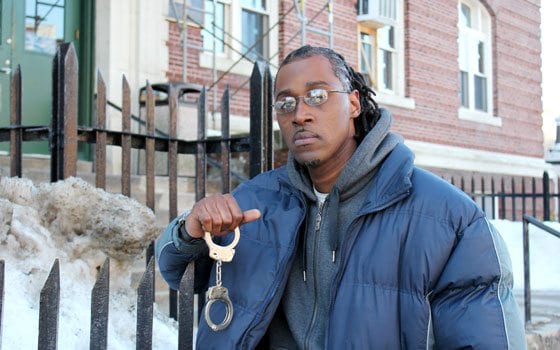
After 20 years as a Massachusetts court officer, Thomas Flint is still waiting for his own day in court.
The 43-year-old Roxbury native served as a court officer for more than two decades until he was abruptly fired in November 2009. Suspecting foul play and racial discrimination, Flint filed a complaint with the Massachusetts Commission Against Discrimination (MCAD), but nearly a year- and-a-half later, Flint said he has yet to find justice.
Flint’s termination was based on a junior court officer’s accusation that Flint verbally assaulted him in a back room of the South Boston Courthouse. “He then raised his voice and began to rant,” the accuser, John Donahue, wrote in a letter to Chief Court Officer Joseph Casey. During this period, of about 30 to 45 minutes, he made various accusations and numerous personal attacks.”
Flint insists that no altercation took place. The South Boston Courthouse, he points out, is small with thin walls, and, as a result, any angry exchange could easily be heard by anyone in the building. But no witnesses corroborate Donohue’s accusations. Even the presiding judge, who was seated on his bench about 15 feet from where the incident allegedly took place, never indicated that he heard anything.
A few days after the accusations were filed in September 2009, Leslie Lewis, regional director of security, met with the South Boston court employees and the presiding judge, Michael Bolden. According to Flint, the judge and court clerk told Lewis they heard nothing. With no witnesses or evidence to substantiate Donohue’s claims, Lewis determined that it was simply a personality conflict and laid the issue to rest.
But a month later, Director of Security Thomas Connolly decided to resurrect the issue by conducting a disciplinary hearing. At this hearing, the only witness called was Donohue — the accuser. No one from Flint’s witness list was questioned. Based on this, Connolly concluded, “I credit Court Officer Donohue’s version of the incident” and “discredit your [Flint’s] version of the incident.” Flint was immediately fired.
On the disciplinary hearing, Flint’s lawyer, James Dilday, said, “I thought it was just totally out of line because he [Connolly] didn’t even talk to anyone.” Dilday said he believes Flint’s hearing was not conducted in “fair or impartial manner.” If it were, Dilday argued, Connolly would have spoken to Judge Bolden as a witness.
In his 20-year career as a court officer, Flint developed a reputation for being a hard worker. Former chief court officer Peter Cordeiro, one of Flint’s superiors during his brief tenure at a Quincy court, said that he never had problems with Flint.
“He was a very good court officer,” he said, and noted that he was “always at work on time,” “knowledgeable,” and “neatly dressed.” As his superior, Cordeiro had to write a performance report on Flint, and said that he gave him a good rating. “He did his job, he did it well.”
Janet Eliasson, a treatment coordinator for the courts, worked with Flint in South Boston. Eliasson called Flint a “very good worker” who “always did his job,” even “more than what he was asked to do.” She also commented that he was a “very nice guy” and “very educated.”
Thomas Connolly could not be reached for an interview.
Flint grew up in Orchard Park, Roxbury, and spent most of his childhood with his grandmother. At the age of 13, he lost his 15-year-old brother, James, to violence. Several years later, Flint graduated from South Boston High School and moved on to Northeastern University, where he set out to study theater. But after a year of college, he quit to work and support his young son. Flint now has two sons, ages 20 and 23, and lives with his girlfriend and her two daughters in Roxbury.
Flint says that he loved his job as a court officer, mainly because he loves working with people. And, being a court officer, Flint met Bostonians from all walks of life.
After his termination, Flint filed a claim with the MCAD, but has yet to receive the results of its investigation. Barbara Green, press liaison for the MCAD, said the case is being “actively investigated,” but that the state agency “[doesn’t] ever give a timeframe.”
But Flint’s accusation of the court’s racism goes deeper than this one incident. On many occasions, in the absence of the deputy chief, white court officer Donohue was put in charge. According to Dilday, this goes against union rules, which state that in a superior’s absence, command goes to the court officer with the most seniority. With 20 years of experience, Flint should have taken charge, not Donohue, who had just three years under his belt.
Last year’s investigation into State Probation Commissioner John J. O’Brien revealed the probation department’s deep-seated corruption and political favoritism. Flint says he believes that similar favoritism plagues the court security system — and that the O’Brien investigation opened the door for people to speak out against it.
For now, Flint is living off unemployment checks, searching for a new job, and trying to fight against the injustice he feels that has cost him his job. He has written letters, asking the help of local politicians, media outlets, and even the NAACP, but is still waiting for the chance to tell his side of the story in court. Until then, he takes solace in the comfort and strength of his family, without whom he said he never would have endured this trial.
“Truth is the truth even if no one agrees,” he says he reminds himself daily. “And a lie is a lie even if everyone agrees.”






